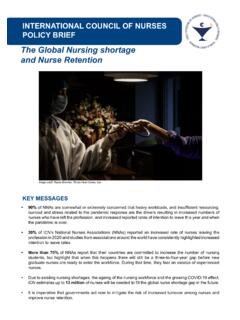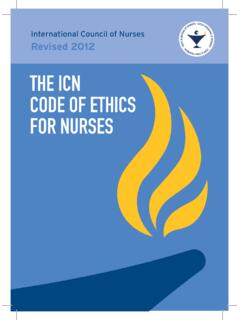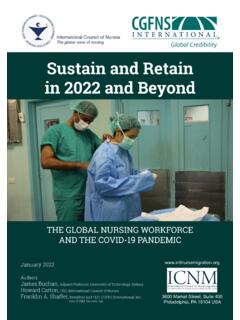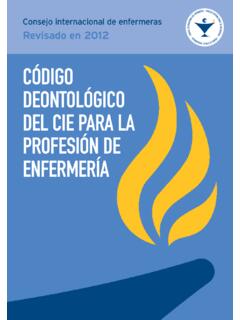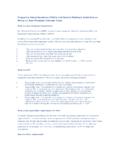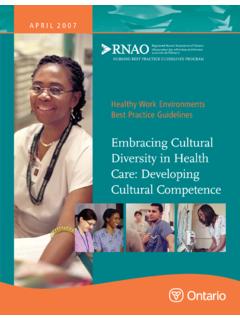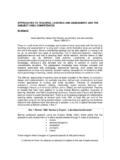Transcription of GUIDELINES ON ADVANCED PRACTICE NURSING 2020
1 INTERNATIONAL COUNCIL OF NURSESGUIDELINES ON ADVANCED PRACTICE NURSING2020 Cover photo: The Twin Bridges nurse PractitionerAll rights, including translation into other languages, reserved. No part of this publication may be reproduced in print, by photostatic means or in any other manner, or stored in a retrieval system, or transmitted in any form, or sold without the express written permission of the International Council of Nurses. Short excerpts (under 300 words) may be reproduced without authorisation, on condition that the source is 2020 by ICN - International Council of Nurses,3, place Jean-Marteau, 1201 Geneva, SwitzerlandISBN: 978-92-95099-71-5 INTERNATIONAL COUNCIL OF NURSESGUIDELINES ON ADVANCED PRACTICE NURSING20202 Mary Wambui Mwaniki2 3 AUTHORSLead AuthorMadrean Schober, PhD, MSN, ANP, FAANPP resident, Schober Global Healthcare ConsultingInternational Healthcare ConsultantsNew York, NY, USAC ontributing AuthorsDaniela Lehwaldt, PhD, MSc, PGDipED, BNSD eputy Chair, ICN NP/APN NetworkAssistant Professor and International LiaisonSchool of NURSING and Human SciencesDublin City University, Republic of IrelandMelanie Rogers, PhDChair, ICN NP/APN NetworkAdvanced nurse PractitionerUniversity Teaching FellowUniversity of Huddersfield, Steinke, DNP, APRN-BC, FNP-CICN NP/APN Core Steering GroupLiaison, PRACTICE SubgroupDirector Family nurse practitioner ProgramIndiana University-Kokomo, Indiana, USASue Turale, RN, DEd, FACN, FACMHNE ditor/ConsultantInternational Council of NursesGeneva.
2 SwitzerlandVisiting Professor, Chiang Mai University, Chiang Mai, ThailandJoyce Pulcini, PhD, PNP-BC, FAAN, FAANPP rofessor, George Washington UniversitySchool of NursingWashington, DC, USAJ osette Roussel, MSc, MEd, RNProgram Lead, NURSING PRACTICE and PolicyPrograms and PolicyCanadian Nurses AssociationOttawa, CanadaDavid Stewart, RN, BN, MHMA ssociate Director, NURSING and Health PolicyInternational Council of NursesGeneva, Switzerland45 ACKNOWLEDGEMENTICN would like to thank the following people who provided a preliminary review of the GUIDELINES : Fadwa Affara, Consultant, Edinburgh, Scotland Fariba Al Darazi, Prior Regional Director of NURSING , WHO, Regional Office of the Eastern Mediterranean Region, Bahrain Majid Al-Maqbali, Directorate of NURSING , Ministry of Health, Oman Michal Boyd, nurse practitioner /Professor, University of Auckland, New Zealand Lenora Brace, President, nurse practitioner Association of Canada Karen Brennan, Past President, Irish Association of nurse Practitioners Denise Bryant-Lukosius, Professor, McMaster University, Canadian Centre for APN Research Jenny Carryer, Professor, Massey University, New Zealand Sylvia Cassiani, Regional Advisor for NURSING , Pan American Health Organization Irma H.
3 De Hoop, Dutch Association of nurse Practitioners, Netherlands Christine Duffield, Professor, University of Technology, Sydney, Australia Pilar Espinoza, Director, Postgraduate, research and international affairs at the health care sciences faculty of the San Sebasti n University, Chile Lisbeth Fagerstrom, Professor, University College of Southeast Norway Glenn Gardner, Emeritus Professor, Queensland University of Technology, Australia Nelouise Geyer, CEO, NURSING Education Association, Pretoria, South Africa Susan Hassmiller, Senior Advisor for NURSING , Robert Wood Johnson Foundation, USA Heather Henry-McGrath, President, Jamaica Association of nurse Practitioners, International Ambassador-American Association of nurse Practitioners Simone Inkrot, Sabrina Pelz, Anne Schmitt, Christoph von Dach, APN/ANP Deutches Netzwerk , Germany and Switzerland Anna Jones, Senior Lecturer, School of Healthcare Sciences, College of Biomedical and Life Sciences, Cardiff University, Wales Elke Keinhath, ADVANCED PRACTICE nurse , APN/ANP Deutches Netzwerk , Germany Mabedi Kgositau, International Ambassador-American Association of nurse Practitioners, University of Botswana Sue Kim, Professor, College of NURSING Yonsei University, South Korea Karen Koh, ADVANCED PRACTICE nurse , National University Hospital, Singapore NURSING Board Katrina Maclaine, Associate Professor, London South Bank University Vanessa Maderal, Adjunct Professor, University of the Philippines Donna McConnell, Lecturer in NURSING , Ulster University, Northern Ireland Evelyn McElhinney, Senior lecturer, Programme Lead MSc NURSING .
4 Advancing Professional PRACTICE , Glasgow Caledonian University, Scotland Arwa Oweis, Regional Advisor for NURSING , WHO, Regional Office of the Eastern Mediterranean Region, Cairo, Egypt Jeroen Peters, Program Director, Nimigen University, Netherlands Andrew Scanlon, Associate Professor, Montclair University, Australia Bongi Sibanda, ADVANCED nurse practitioner , Anglophone Africa APN Coalition Project, Zimbabwe Anna Suutaria, Head of International Affairs, Finnish Nurses Association Peter Ullmann, Chair, APN/ANP Deutsches Netzwerk , Germany Zhou Wentao, Director, MScN Programme, National University of Singapore Kathy Wheeler, Co-chair International Committee, American Association of nurse Practitioners Frances Wong, Professor, Hong Kong Polytechnic UniversityGUIDELINES ON ADVANCED PRACTICE NURSING 202045 TABLE OF CONTENTSList of Tables/Figures ..6 Glossary of terms ..6 Foreword.
5 7 Purpose of the ICN APN GUIDELINES ..8 Abstract ..8 Chapter One: ADVANCED PRACTICE NURSING .. Introduction .. Assumptions about ADVANCED PRACTICE NURSING .. ADVANCED PRACTICE NURSING Characteristics .. Country Issues that Shape Development of ADVANCED PRACTICE NURSING ..11 Chapter Two: The Clinical nurse Specialist (CNS) .. ICN Position on the Clinical nurse Specialist .. Background of the Clinical nurse Specialist .. Description of the Clinical nurse Clinical nurse Specialist Scope of PRACTICE .. Education for the Clinical nurse Specialist .. Establishing a Professional Standard for the Clinical nurse Specialist .. Clinical nurse Specialists Contributions to Healthcare Services .. Differentiating a Specialised nurse and a Clinical nurse Specialist ..15 Chapter Three: The nurse practitioner .. ICN Position on the nurse practitioner .. Background of the nurse practitioner .
6 Description of the nurse practitioner .. nurse practitioner Scope of nurse practitioner Education .. Establishing a Professional Standard for the nurse practitioner .. nurse practitioner Contributions to Healthcare Four: Distinguishing the Clinical nurse Specialist and the nurse practitioner .. ICN Position on the Clarification of ADVANCED NURSING Designations ..23 References ..27 Appendices ..33 Appendix 1: Credentialing Terminology ..33 Appendix 2: The International Context and Country Examples of the CNS ..33 Appendix 3: The International Context and Country Examples of the NP ..35 Appendix 4: Country exemplars of adaptations or variations of CNS and NP ..38 GUIDELINES ON ADVANCED PRACTICE NURSING 20206 LIST OF TABLES/FIGUREST able 1: Characteristics delineating Clinical nurse Specialist practiceTable 2: Differentiating a Specialised nurse and a Clinical nurse SpecialistTable 3: Characteristics of Clinical nurse Specialists and nurse PractitionersTable 4: Similarities between Clinical nurse Specialists and nurse PractitionersTable 5: Differentiating the Clinical nurse Specialist and the nurse PractitionerFigure 1: Progression from Generalist nurse to Clinical nurse SpecialistFigure 2: Distinction between Clinical nurse Specialist and nurse PractitionerGLOSSARY OF TERMSA dvanced NURSING PRACTICE (ANP) ADVANCED NURSING PRACTICE is a field of NURSING that extends and expands the boundaries of NURSING s scope of PRACTICE , contributes to NURSING knowledge and promotes advancement of the profession (RNABC Policy Statement, 2001).
7 ANP is characterised by the integration and application of a broad range of theoret-ical and evidence-based knowledge that occurs as part of graduate NURSING education (ANA, 2010 as cited in Hamric & Tracy, 2019, p. 63). ADVANCED PRACTICE nurse (APN) An ADVANCED PRACTICE nurse (APN) is a generalist or specialised nurse who has acquired, through additional graduate education (minimum of a master s degree), the expert knowledge base, complex decision-making skills and clinical competencies for ADVANCED NURSING PRACTICE , the characteristics of which are shaped by the context in which they are credentialed to PRACTICE (adapted from ICN, 2008). The two most commonly identified APN roles are CNS and NP. ADVANCED PRACTICE NURSING (APN) ADVANCED PRACTICE NURSING , as referred to in this paper, is viewed as ADVANCED NURSING interventions that influ-ence clinical healthcare outcomes for individuals, fam ilies and diverse populations.
8 ADVANCED PRACTICE NURSING is based on graduate education and prepar-ation along with the specification of central criteria and core competencies for PRACTICE (AACN, 2004, 2006, 2015; Hamric & Tracy, 2019). ADVANCED PRACTICE Registered nurse (APRN)APRN, as used in the USA, is the title given to a nurse who has met education and certification requirements and obtained a license to PRACTICE as an APRN in one of four APRN roles: certified registered nurse anesthe-tist (CRNA), certified nurse -midwife (CNM), Clinical nurse Specialist (CNS), and certified nurse practitioner (CNP) (APRN Consensus Model, 2008). Clinical nurse Specialist (CNS)A Clinical nurse Specialist is an ADVANCED PRACTICE nurse who provides expert clinical advice and care based on established diagnoses in specialised clin-ic al fields of PRACTICE along with a systems approach in practicing as a member of the healthcare practitioner (NP)A nurse practitioner is an ADVANCED PRACTICE nurse who integrates clinical skills associated with NURSING and medicine in order to assess, diagnose and man-age patients in primary healthcare (PHC) settings and acute care populations as well as ongoing care for popu lations with chronic illness.
9 GUIDELINES ON ADVANCED PRACTICE NURSING 202067 FOREWORD2020 has been named The International Year of the nurse and Midwife by the World Health Organization. It celebrates both the professionals who provide a broad range of essential health services to people every-where as well as the bicentenary of the birth of Florence Nightingale. However, the International Council of Nurses (ICN) recognises that this year needs to be more than just a celebration. It needs to be a time of action and commitment by governments, health sys-tems and the public to support the capacity, capability and empowerment of the NURSING profession to meet the growing demands and health needs of individuals and communities. Without the NURSING profession, millions of people around the world will not be able to access quality, safe and affordable healthcare services. As the largest group of healthcare workers providing the vast majority of care, particularly in the primary care setting, it is not surprising that the NURSING workforce investment can yield significant improvement in patient outcomes.
10 Throughout history, we can see the continual evolution of the NURSING profession in order to address the health, societal and person-centred care is for this reason, that as the global voice of NURSING , ICN has been calling for investment in NURSING , and in particular APN, to address global health challenges. As a Commissioner on the WHO High Level Commission on Noncommunicable Diseases (NCDs), the ICN President witnessed the global community wrestle with solutions to address the need to reduce mortality from NCDs by 30% by 2030. What became clear was that the status quo cannot continue and that governments need to reorient their health systems and support the health workforce, particularly APNs, to effectively respond to promotion, prevention and management of disease. This is echoed in the Astana Declaration with the visionary pursuit of achieving Health for All through Primary Health Care.
